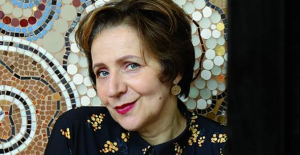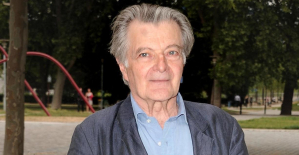In "normal times" such a decision would have been unthinkable, especially for a Green Senator for the Environment. Jens Kerstan, President of the Hamburg Environment and Energy Agency, made that very clear himself. He had just announced that two of Hamburg's power plants, namely the Tiefstack thermal power plant and the Haferweg heating plant, would be converted from gas to oil operation. Oil is already being bunkered, Kerstan announced to a surprised audience in the town hall.
The two power plants are connected to the district heating network of the Hanseatic city. Each of the two locations has three heating boilers, each with an output of 50 megawatts, which are switched on at peak loads. So far they have been powered by gas. However, according to Kerstan, that will not happen in the coming heating period. "The two power plants will not use any gas this winter."
Because in order for Hamburg to be able to meet its obligation to save at least 15 percent of its gas consumption, drastic measures have to be taken. A third of the 21 terawatt hours of gas used in Hamburg each year are consumed by large-scale industry – with little influence on the part of the Senate. The companies have recently reduced their consumption by 39 percent compared to 2020 and 2021. However, according to Kerstan, this is partly due to lower demand for their products.
So it's now about the gas consumption for district heating generation, which has been in the hands of the city again for several years.
Kerstan actually wanted to get rid of fossil fuels as quickly as possible. Highly innovative projects are underway at several locations in the city to replace the old coal-fired power plant in Wedel with decentralized units that generate district heating from renewable energy. The Tiefstack power plant, which serves the base load of district heating from coal firing, was to be quickly converted to gas and, in the long term, to biomass.
Kerstan obviously finds it difficult to go back to oil. "Some things hurt me," he said when asked. But now he is “just doing what needs to be done.” And that is to secure the heat supply for the coming winter. He doesn't want to imagine the ruptures that would occur within society if it got cold in the homes of many Hamburgers in winter.
The opposition showed little understanding for the needs of the green environment senator on Tuesday. "The red-green Senate should have reactivated the Moorburg power plant, which the CDU applied for in April," said Dennis Thering, head of the CDU parliamentary group in Hamburg's parliament. “Massive potential was wasted here.” It remains the “core error” of the Senate “to have shut down the most modern coal-fired power plant in Europe with Moorburg. If that hadn't happened, we would have less of a supply problem," said FDP politician Anna von Treuenfels Frowein.
The power plant was originally built to supply Hamburg with electricity and district heating, but was never connected to the district heating network. Because it never reached its potential utilization and was not economically interesting enough, the operator Vattenfall shut it down. The Senate is planning a production facility for green hydrogen at the site.

 His body naturally produces alcohol, he is acquitted after a drunk driving conviction
His body naturally produces alcohol, he is acquitted after a drunk driving conviction Who is David Pecker, the first key witness in Donald Trump's trial?
Who is David Pecker, the first key witness in Donald Trump's trial? What does the law on the expulsion of migrants to Rwanda adopted by the British Parliament contain?
What does the law on the expulsion of migrants to Rwanda adopted by the British Parliament contain? The shadow of Chinese espionage hangs over Westminster
The shadow of Chinese espionage hangs over Westminster Parvovirus alert, the “fifth disease” of children which has already caused the death of five babies in 2024
Parvovirus alert, the “fifth disease” of children which has already caused the death of five babies in 2024 Colorectal cancer: what to watch out for in those under 50
Colorectal cancer: what to watch out for in those under 50 H5N1 virus: traces detected in pasteurized milk in the United States
H5N1 virus: traces detected in pasteurized milk in the United States What High Blood Pressure Does to Your Body (And Why It Should Be Treated)
What High Blood Pressure Does to Your Body (And Why It Should Be Treated) “I’m interested in knowing where the money that the State takes from me goes”: Bruno Le Maire’s strange pay slip sparks controversy
“I’m interested in knowing where the money that the State takes from me goes”: Bruno Le Maire’s strange pay slip sparks controversy Despite the lifting of the controllers' strike, massive flight cancellations planned for Thursday, April 25
Despite the lifting of the controllers' strike, massive flight cancellations planned for Thursday, April 25 The right deplores a “dismal agreement” on the end of careers at the SNCF
The right deplores a “dismal agreement” on the end of careers at the SNCF The United States pushes TikTok towards the exit
The United States pushes TikTok towards the exit Saturday is independent bookstore celebration
Saturday is independent bookstore celebration In Paris as in Marseille, the Flames ceremony opens to fans of rap and hip-hop
In Paris as in Marseille, the Flames ceremony opens to fans of rap and hip-hop Sale of the century for a mysterious painting by Klimt, in Austria
Sale of the century for a mysterious painting by Klimt, in Austria Philippe Laudenbach, actor with more than a hundred supporting roles, died at 88
Philippe Laudenbach, actor with more than a hundred supporting roles, died at 88 Skoda Kodiaq 2024: a 'beast' plug-in hybrid SUV
Skoda Kodiaq 2024: a 'beast' plug-in hybrid SUV Tesla launches a new Model Y with 600 km of autonomy at a "more accessible price"
Tesla launches a new Model Y with 600 km of autonomy at a "more accessible price" The 10 best-selling cars in March 2024 in Spain: sales fall due to Easter
The 10 best-selling cars in March 2024 in Spain: sales fall due to Easter A private jet company buys more than 100 flying cars
A private jet company buys more than 100 flying cars This is how housing prices have changed in Spain in the last decade
This is how housing prices have changed in Spain in the last decade The home mortgage firm drops 10% in January and interest soars to 3.46%
The home mortgage firm drops 10% in January and interest soars to 3.46% The jewel of the Rocío de Nagüeles urbanization: a dream villa in Marbella
The jewel of the Rocío de Nagüeles urbanization: a dream villa in Marbella Rental prices grow by 7.3% in February: where does it go up and where does it go down?
Rental prices grow by 7.3% in February: where does it go up and where does it go down? Sale of Biogaran: The Republicans write to Emmanuel Macron
Sale of Biogaran: The Republicans write to Emmanuel Macron Europeans: “All those who claim that we don’t need Europe are liars”, criticizes Bayrou
Europeans: “All those who claim that we don’t need Europe are liars”, criticizes Bayrou With the promise of a “real burst of authority”, Gabriel Attal provokes the ire of the opposition
With the promise of a “real burst of authority”, Gabriel Attal provokes the ire of the opposition Europeans: the schedule of debates to follow between now and June 9
Europeans: the schedule of debates to follow between now and June 9 These French cities that will boycott the World Cup in Qatar
These French cities that will boycott the World Cup in Qatar Montpellier-Nantes: at what time and on which channel to watch the Ligue 1 match?
Montpellier-Nantes: at what time and on which channel to watch the Ligue 1 match? Ligue 1: Luis Enrique leaves many PSG players to rest in Lorient
Ligue 1: Luis Enrique leaves many PSG players to rest in Lorient Football: Deschamps, Drogba, Desailly... Beautiful people with Emmanuel Macron to play with the Variétés
Football: Deschamps, Drogba, Desailly... Beautiful people with Emmanuel Macron to play with the Variétés Football: “the referee was bought”, Guy Roux’s anecdote about a European Cup match… with watches and rubies
Football: “the referee was bought”, Guy Roux’s anecdote about a European Cup match… with watches and rubies


















